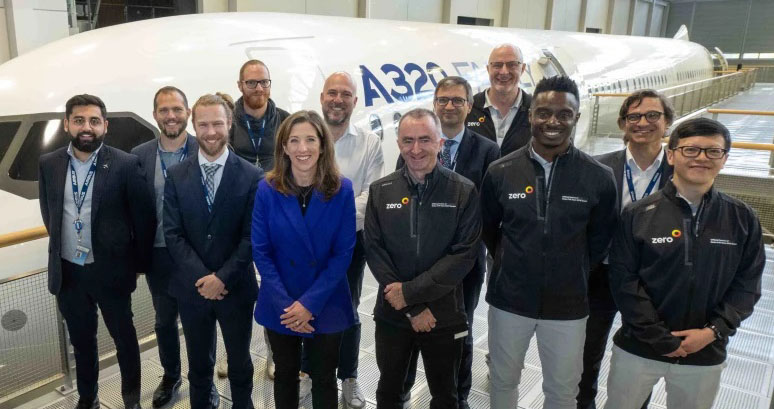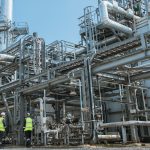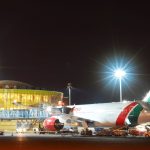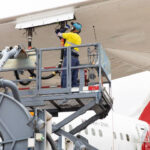Two emerging UK-based renewable fuel producers have announced plans to scale the development of eSAF, sustainable aviation fuel created by combining captured carbon dioxide and green hydrogen through the power-to-liquid (PtL) pathway. OXCCU, a climate technology spinoff from Oxford University, will partner with another UK company, the infrastructure provider px Group, to develop a first-of-a-kind eSAF demonstration plant at the Saltend Chemicals Park in the Humber region, while Zero Petroleum has signed a MoU with Airbus to advance eSAF development to enable commercial-scale production of 100% drop-in synthetic jet fuel from 2026. The UK’s proposed SAF mandate includes a PtL obligation on fuel producers to supply 0.2% of total jet fuel demand from 2028, rising to 3.5% in 2040.
Key benefits of eSAF are the abundance of CO2 either captured from the atmosphere or direct from industrial plants, and the ability to recycle the toxic gases into energy products including SAF and renewable diesel fuel.
OXCCU develops catalysts and processes to transform carbon dioxide and green hydrogen into non-fossil fuels, chemicals and plastics. It plans to develop SAF by using an iron-based catalyst to combine captured CO2 and green hydrogen in a single step, instead, it says, of the traditional, more complex and more expensive two-step process involving Reverse Water Gas Shift (RWGS) and Fischer-Tropsch reaction.
The company has demonstrated what it claims is the world’s first direct CO2 hydrogenation process, converting CO2 into SAF while creating minimal oxygenate byproducts, and will develop the first-of-a-kind demo plant at px Group’s Saltend Chemicals Park, with the fuel to be created from a combination of biogenic carbon dioxide and green hydrogen.
With a planned start date for operations of 2026, the fuel company’s initial daily production will be 160 kilograms (200 litres) of liquid fuel, most of which will be SAF, while px Group will provide the engineering design and construction of the Outside Battery Limits (OSBL) support facilities.
OXCCU’s renewable fuel plans have attracted significant support from climate-focused investors, with backers including Clean Energy Ventures, Aramco Ventures, United Airlines Ventures Sustainable Flight Fund, Braavos Capital, and Eni Next, the corporate venture division of Italy’s Eni energy company.
“The strategic combination of OXCCU’s highly efficient novel catalyst and process with px Group’s world leading facilities creates the perfect environment for us to scale up,” said OXCCU’s CEO Andrew Symes. “This project will demonstrate CO2 and hydrogen directly converted into jet fuel-range hydrocarbons and the potential for much lower cost SAF.”
Geoff Holmes, px Group’s CEO, welcomed the new partnership and the development at his company’s Saltend facility. “We are passionate about cutting CO2 emissions and helping the UK to meet its sustainability ambitions,” he said. “This groundbreaking project with OXCCU further meets this commitment and demonstrates the confidence in Saltend as a pioneering centre for industrial decarbonisation projects.”
The Zero Petroleum partnership with Airbus is designed to leverage both companies’ experience in order to progress the development of eSAF and expedite its certification as a recognised zero emission aviation fuel.
Zero is led by founder and CEO Paddy Lowe, a former engineer and executive of the Williams, Mercedes and McLaren Formula One motor racing teams.
The company recently opened Plant Zero.1 near Oxford, which it claims to be the world’s first fully-featured synthetic fuel plant. The facility contains equipment for all three separate processes used to create the fuel: direct air capture, electrolysis to create green hydrogen and Zero’s proprietary Fischer-Tropsch technology, DirectFT. The company plans to build a commercial scale plant (Plant Zero.2) to start production of its eSAF in 2026.
Airbus is targeting 15% SAF in its global fuel mix by the end of this year and at least 30% by 2030 and has partnered in industry trials the assess the impact of SAF use on reducing CO2 and non-CO2 aircraft emissions.
“By combining Airbus’ legacy of innovation with Zero’s proven, high-performance eSAF solution, we are well positioned to advance on the industry’s net zero decarbonisation targets faster than today,” said Lowe.
Zero added that both companies had made significant contributions to decarbonising air transport, with the fuel company securing in 2021 the Guinness Book of Records title of ‘first aircraft powered by synthetic fuel’, and Airbus having successfully tested commercial and military aircraft with 100% SAF.
“The fuel’s energy density and ability to power existing engines without modification make it an ideal solution for aviation, which faces distinct challenges as a hard-to-abate sector,” said the company. “Zero’s agreement with Airbus could lead to a new technology pathway being certified for the everyday use of eSAF in aviation.”

Top photo: OXCCU’s first demo plant will be located at px Group’s Saltend Chemicals Park in north-east England
Bottom photo: Airbus CSO Julie Kitcher and Zero Petroleum CEO Paddy Lowe with their teams















More News & Features
UK government starts new consultation on SAF revenue certainty mechanism
African Development Bank and Japanese industrialist unite to explore SAF production in Africa
LanzaJet and KMG agree to progress SAF production project in Kazakhstan
SkyNRG says e-SAF and carbon removals should not be competing strategies for aviation decarbonisation
South Korea announces mandatory SAF blending for departing international flights from 2027
Catagen launches SAF production company and signs offtakes with Ryanair and Shell